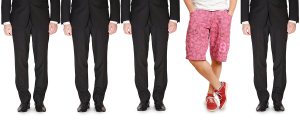Is Professionalism Subjective?

Professional: of, relating to, or characteristic of a profession.
Profession: a calling requiring specialized knowledge and often long and intensive academic preparation. So from the looks of it, a profession is a calling. This is rather interesting and a point to take note of as I’ll surely come back to this.
Now when we think of being unprofessional, specifically in the workplace, an array of things come to mind. Let’s take a look at the most obvious:
- Being rude to customers, colleagues and/or superiors (although the latter could result in job termination).
- Using profanity and crude language when speaking to customers and/or colleagues.
- Comments and/or jokes that can be considered offensive —those pertaining to an individual’s race, gender, religious affiliations or sexual orientation.
- Verbal arguments and physical altercations.
- Tardiness and extensive absences.
- Sleeping on the job (In June, 8 TSA officials were fired for this).
- Being loud or obnoxious while working; constantly disturbing others.
- Dressing inappropriately with too loose or too tight clothing. Looking unkept, disheveled and messy. Similarly, an unorganized and cluttered workspace can show signs of unprofessionalism as well.
- Gossiping and telling lies.
A list of “how not to act” could go on and on. Yet, I wonder what happens when you become more specific and the professionalism line isn’t as clear. For example, is it unprofessional for a person to display his or her religious beliefs while at work? Many people put quotes and/or phrases on business cards and email signatures. What happens when they delve into religion? Is it suitable to include a scripture from the bible or a verse from the Quran on your business card, or is this practice now unprofessional?
During my junior year of college, a professor told me I should remove the scripture I had in my email signature because, as a journalist, you’re supposed to be neutral. My email’s signature was unprofessional. She was partially correct; journalists are supposed to be neutral (although that is unrealistic because everyone has biases), but although I was a journalism major, I was not nor desired to ever become a journalist.
Still pertaining to religion in the workplace, what about praying over, giving thanks or “blessing” food before consumption, as many religious practices encourage? It is unprofessional for someone to do this when in the company of others? Say during a meeting, conference or company gathering?
I also wonder where the line is drawn with unprofessional appearance. There is an unspoken rule about how an individual should look in the workplace. What about culture-specific attire including headpieces and colorful garments? And hair colors such as green, blue, orange and purple are most often considered unprofessional, but are they truly? Numerous tattoos and body piercings send red flags for most employers, but others may not deem them unprofessional.
We discovered earlier that a profession is a calling, or something deep inside that pushes us in a certain direction. I believe we all have a specific calling; for some it is to teach, and for others it may be managing a group of people. If our profession is our calling and answering this call makes us a professional, then our day-to-day actions as a professional produce professionalism. What did I just say?
The bottom line is that professionalism isn’t black and white, but it varies in color. To be professional depends on the environment we work in; the culture of the New York Stock exchange dictates the company’s professionalism standards. The same is true for the Walt Disney Company, yet both would have totally different concepts of what it means for employees to be professional.
Appearance, cultural and religious practices, interacting with customers and co-workers: Although there seems to be a common belief on what is and is not professional in these areas, in reality, the deciding factors fluctuate.
I’m interested to see others’ perspectives. Share your thoughts on whether or not you think professionalism is subjective.

